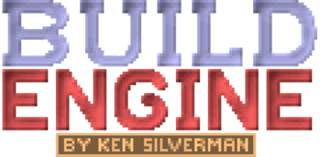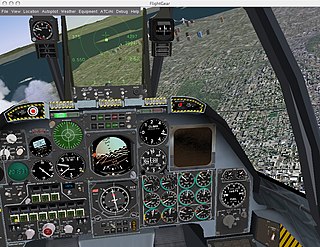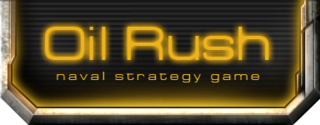
Quake II is a 1997 first-person shooter video game developed by id Software and published by Activision. It is the second installment of the Quake series, following Quake.

Catacomb 3-D is a first-person shooter video game, the third in the Catacomb series, the first of which to feature 3D computer graphics. It was developed by id Software and originally published by Softdisk under the Gamer's Edge label, released in November 1991. The player takes control of the high wizard Petton Everhail, descending into the catacombs of the Towne Cemetery to defeat the evil lich Nemesis and rescue his friend Grelminar.
Video game modding is the process of alteration by players or fans of one or more aspects of a video game, such as how it looks or behaves, and is a sub-discipline of general modding. Mods may range from small changes and tweaks to complete overhauls, and can extend the replay value and interest of the game.

The Build Engine is a first-person shooter engine created by Ken Silverman, author of Ken's Labyrinth, for 3D Realms. Like the Doom engine, the Build Engine represents its world on a two-dimensional grid using closed 2D shapes called sectors, and uses simple flat objects called sprites to populate the world geometry with objects.

The Quake engine is the game engine developed by id Software to power their 1996 video game Quake. It featured true 3D real-time rendering. Since 1999, it has been licensed under the terms of GNU General Public License v2.0 or later.

id Tech 3, popularly known as the Quake III Arena engine, is a game engine developed by id Software for its Quake III Arena. It has been adopted by numerous games. It competed with the Unreal Engine; both engines were widely licensed.

The Quake II engine is a game engine developed by id Software for use in their 1997 first-person shooter Quake II. It is the successor to the Quake engine. Since its release, the Quake II engine has been licensed for use in several other games.
Cube 2: Sauerbraten is a first-person shooter released for Microsoft Windows, Linux, FreeBSD, OpenBSD, and Mac OS X using OpenGL and SDL.

id Tech 4, popularly known as the Doom 3 engine, is a game engine developed by id Software and first used in the video game Doom 3. The engine was designed by John Carmack, who also created previous game engines, such as those for Doom and Quake, which are widely recognized as significant advances in the field. This OpenGL-based game engine has also been used in Quake 4, Prey, Enemy Territory: Quake Wars, Wolfenstein, and Brink. id Tech 4 is licensed under the terms of the GNU General Public License v3.0 or later.

Alien Arena is an open-source, stand-alone first-person shooter video game. Begun by COR Entertainment in 2004, the game combines a 1950s-era sci-fi atmosphere with gameplay similar to the Quake, Doom, and Unreal Tournament series. Alien Arena focuses mainly on online multiplayer action, although it does contain single-player matches against bots.
Linux Game Publishing was a software company based in Nottingham in England. It ported, published and sold video games running on Linux operating systems. As well as porting games, LGP also sponsored the development of Grapple, a free software network library for games. As well as acting as a Linux game porter in of themselves, they also functioned as a publisher for other Linux game developers and porters. The company was dissolved on 3 May 2011.

An open-source video game, or simply an open-source game, is a video game whose source code is open-source. They are often freely distributable and sometimes cross-platform compatible.
Linux-based operating systems can be used for playing video games. Because few games natively support the Linux kernel, various software has been made to run Windows games, software, and programs, such as Wine, Cedega, DXVK, and Proton, and managers such as Lutris and PlayOnLinux. The Linux gaming community has a presence on the internet with users who attempt to run games that are not officially supported on Linux.

Ryan C. Gordon is a computer programmer and former Loki Software employee responsible for icculus.org, which hosts many Loki Software projects as well as others. Gordon's site hosts projects with the code from such commercial games as Duke Nukem 3D, Shadow Warrior, Quake III Arena and other free and open source projects for multiple platforms.

Timothée Besset is a French software programmer, best known for supporting Linux, as well as some Macintosh, ports of id Software's products. He was involved with the game ports of various id properties through the 2000s, starting with Quake III Arena. Since the development of Doom 3 he was also in charge of the multiplayer network code and various aspects of game coding for id, a role which had him heavily involved in the development of their online game QuakeLive. Since departing id in January 2012 he has worked as a software contractor, including for Valve Software.

Xonotic is a free and open-source first-person shooter video game. It was developed as a fork of Nexuiz, following controversy surrounding the game's development. The game runs on a heavily modified version of the Quake engine known as the DarkPlaces engine. Its gameplay is inspired by Unreal Tournament and Quake, but with various unique elements.

Oil Rush is a tower defense real-time strategy game developed by UNIGINE Holding S.à r.l. using their Unigine engine technology. Set in a flooded, post-apocalyptic world, the game consists of players fighting over control of the world's last remaining oil reserves. The game was released as a digital download for Microsoft Windows, Linux, and OS X.

Unvanquished is a free and open-source video game. It is a multiplayer first-person shooter and real-time strategy game where Humans and Aliens fight for domination.

Red Eclipse is an open-source first-person shooter that is forked from Cube 2: Sauerbraten. Like the original Cube 2, it features multiplayer gameplay as well as in-game level editing, but with improved graphics and a focus on parkour movement. The game is free and open-source software, released under the zlib license, and developed by an open community of contributors. Its content is free, and released under a CC BY-SA license.













